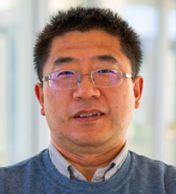
Dr. Lifeng Liu
International Iberian Nanotechnology Laboratory (INL), Portugal
Title: Transition metal phosphide electrocatalysts for electrochemical and photoelectrochemical water splitting
Abstract:
Splitting water into hydrogen and oxygen is an ecofriendly way to
produce high-purity hydrogen fuels and has shown substantial promise as a means
for renewable energy storage. To enable widespread deployment of water
electrolyzers, it is of paramount importance to develop efficient, durable and
inexpensive water splitting catalysts so that the electrolyzed hydrogen fuels
can become economically competitive and viable. In this presentation, I will
show our recent efforts to developing transition metal-based electrocatalysts,
in particular transition metal phosphides [1-6]. I will first show
self-supported transition metal phosphide electrodes and their electrocatalytic
performance for the hydrogen evolution reaction (HER), the oxygen evolution
reaction (OER) as well as overall water splitting. Moreover, I will show that
the electrocatalytic activity of transition metal phosphides can be improved by
rational microstructural and compositional engineering. Furthermore, recent
attempts to coupling transition metal-based electrocatalysts to semiconductor
photoelectrodes for solar-driven water splitting will also be presented [7,8].
References
[1] X. G. Wang, et al. Chem. Commun. 2015, 51, 6738
[2] X. G. Wang, et al. Angew. Chem. Int. Ed. 2015, 54, 8188
[3] X. G. Wang, et al. Adv. Funct. Mater. 2016, 26, 4067
[4] J. Y. Xu, et al. Energy Environ. Sci. 2018, 11, 1819
[5] J. Y. Xu, et al. Chem. Sci. 2018, 9, 3470
[6] J. Y. Xu, et al. J. Mater. Chem. A 2018, 6, 20646.
[7] S. M. Thalluri, et al. Nano Res. 2018, 9, 4823
[8] S. M. Thalluri, et al. ACS Energy Lett. 2019, 7, 1755
Biography:
Lifeng Liu (Researcher ID: A-2522-2012, Orcid
ID: 0000-0003-2732-7399) is currently Staffer Researcher (tenured) and Research
Group Leader at the International Iberian Nanotechnology Laboratory (INL) – the
first international research organization worldwide in the field of nanoscience
and nanotechnology. He is also Honorary Senior Research Fellow at Swansea
University, UK. He obtained his B. S. degree in Applied Physics from Beijing
Jiaotong University (2001), and both his MS (2004) and PhD (2007) degrees in
Condensed Matter Physics from the Institute of Physics, Chinese Academy of
Sciences (IOP-CAS). He joined Max Planck Institute of Microstructure Physics –
Halle (MPI-Halle), Germany in 2007, first working as a postdoctoral researcher
and then as a staff scientist. He started his independent research career in
2008 and became a Group Head in 2009. In 2011, he moved to INL and set up a
research group there. Lifeng Liu has been actively working on nanomaterials and
nanostructures since 2002, with particular emphases on fabrication and
characterization of complex nanostructures, nanoscale solid-state reactions,
ferroelectric nanostructures and nano-electrocatalysts. His present interest mainly
focuses on nanomaterials for electrochemical energy storage and conversion. So
far, he has been granted 2 PCT patents and authored/coauthored 140+
peer-reviewed papers in major international journals, which have been
collectively cited 7600+ times (Google Scholar, as of July 2019), leading to an
H-index of 52. Honors and awards he was granted recently include: FCT
Investigator Grant 2014, Young Researcher Award 2015 by the Portuguese
Electrochemical Society, the Scientist Medal by the International Association
of Advanced Materials (IAAM) 2018, and ChemComm Emerging Investigator 2019.